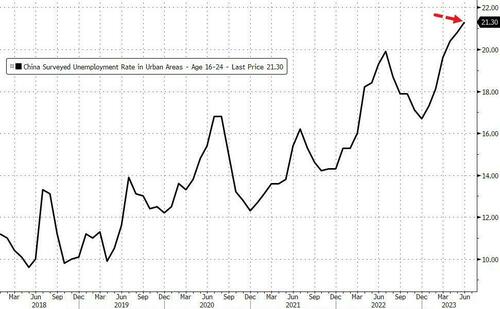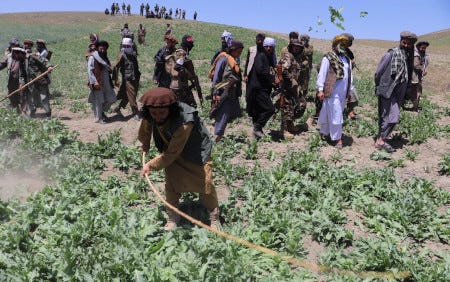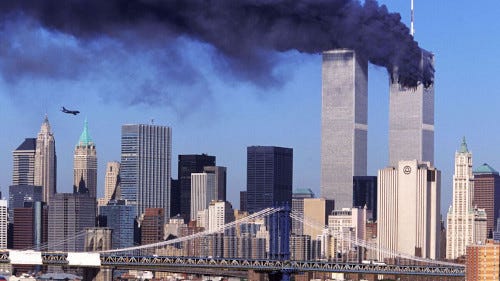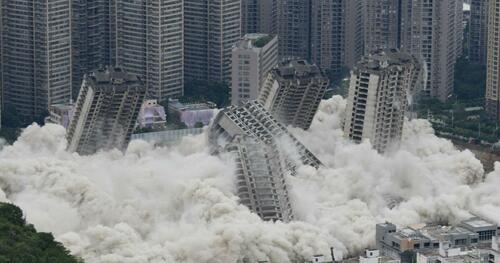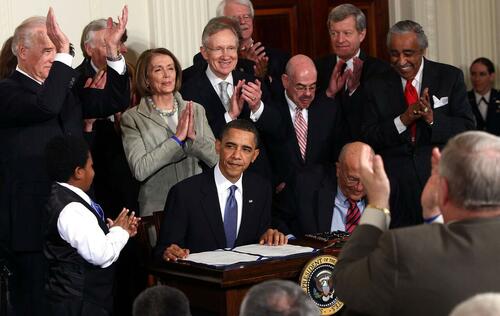This post is focused on the fires of 9/11 and how implausible the explanation that they led to the collapse of the towers is. I have personally thought so from the very beginning although at first I could not admit the possibility of a planned demolition. But then again, if not that, then what?
Having visited the towers in 1977 just after they were built, I still remember how strong the core was and the fact that it was specifically designed to resist winds which exerted forces an order of magnitude larger than a plane.
This was then the question on everyone's lips and the answer then was clear: The towers were built for the next 100 years and with some refurbishment they could easily last much longer...
News anchor Dan Rather's reaction to the THIRD total building collapse on 9/11
September 12, 2023
“For the third time today, it’s reminiscent of those pictures we’ve all seen too much on television before when a building was deliberately destroyed by well-placed dynamite to knock it down …” –well-known CBS news anchor Dan Rather
The extraordinary claim that fire was the ultimate cause of the complete progressive collapse of three skyscrapers on September 11, 2001 is the flimsy foundation upon which the Police State is being constructed. How realistic is that claim?
Ever since a B-25 hit the Empire State Building on the morning of July 28, 1945, high-rises have been designed to withstand the impact of airliners similar to the ones that hit the Twin Towers on 9/11.
Even unprepared, the Empire State Building, hit on Sat. morning, was back in service in two days.
In the case of the Twin Towers, based on a study definitively described in City in the Sky as “the most complete and detailed of any ever made for any building structure,” this plane-strike resistant design is verified by Towers head structural engineer John Skilling like this – – –
Concerned because of a case where an airplane hit the Empire State Building, Skilling’s people did an analysis that showed the towers would withstand the impact of a Boeing 707. …According to Skilling, “There would be a horrendous fire. A lot of people would be killed,” he said. “The building structure would still be there.” –Seattle Times, Feb. 27, 1993
This is further verified by Chief NIST 9/11 Investigator Dr. Shyam Sunder in The New York Times like this:
“The newly disclosed documents, from the 1960’s, show that the Port Authority considered aircraft moving at 600 m.p.h., slightly faster and therefore more destructive than the ones that did hit the towers.”
In the video clip below, Twin Towers project manager Frank D. Martini summed it up this way: “It would be like sticking a pencil through mosquito netting.” Martini claimed the towers could withstand several airliner impacts without serious danger of failure.
Towers would survive plane impacts
Towers Project Manager Frank D. Martini
As predicted — and thus verifying the above design assumptions — each tower returned to a stable configuration within approximately four minutes after the planes struck. The South Tower remained standing for 56 minutes after the plane hit and the North Tower for 102 minutes.
Since neither tower collapsed till well after the plane impacts, it’s clear that the collapses must have been the result of something other than structural damage.
In fact, our skyscrapers are incredibly durable. For example, there was the Feb. 26, 1993 1,336-pound bomb attack on the North Tower. It blew a 98 foot hole through four basement pylons — and killed 6 and injured 1,042. But the Tower didn’t collapse and was back in service in short order.
However, the fact that structural damage was not the cause of collapse on 9/11 is most clear in the case of the least well-known — some say “hidden in plain sight” — of the three, Building 7 (WTC7). NIST, charged by Congress with the official investigation, summarizes the role of structural damage in Building 7’s collapse like this:
“Other than initiating the fires in WTC 7, the damage from the debris from WTC 1 had little effect on initiating the collapse of WTC 7. The building withstood debris impact damage that resulted in seven exterior columns being severed …This was near the west side of the south face of the building and was far removed from the buckled column that initiated the collapse. …” –NIST NCSTAR 1A, WTC Investigation… xxxvii… xxxvii
So if these three collapses weren’t the result of structural damage, what was the cause?
At first glance, it seems reasonable to suppose that fire must have been that cause, especially since it was present in all three cases — and NIST’s Dr. Sunder specifically claims fire for Building 7 this way:
“We really have a new kind of progressive collapse that we have discovered here, which is a fire-induced progressive collapse. In fact, we have shown FOR THE FIRST TIME that fire can induce a progressive collapse.” –WTC Building 7 Chief Investigator Dr. Shyam Sunder
However, things aren’t that simple.
Dr. Sunder’s claim of a “first time” is the first clue. It points out that such a fire-induced progressive collapse had never happened before in the entire 117 year history of high-rises at that time. That makes Dr. Sunder’s fire-induced claim unprecedented (without a precedent) and thus by definition, extraordinary.
And there’s another clue: On Feb. 14, 1975, the North Tower had a serious fire burn out of control for about three hours and spread to an estimated 65% of floor eleven without doing any structural damage (two to three times as long as the fires burned in the Towers on 9/11) — and the building was open for business the next day.
And this from head structural engineer John Skilling, remember. “There would be a horrendous fire. …” he said. “The building structure would still be there.”
In fact, this extreme level of fire resistance in all steel-framed high-rises has been designed-in for over a century and was common and accepted knowledge. Dr. Sunder’s extraordinary “for the first time” claim for starters. And – – –
“New York City, 2001. No tall building had ever collapsed primarily due to fire …” –NIST commentator (intro to NIST Building 7 video linked above)
“…prior to that day [Sept. 11, 2001] high-rise structures had never collapsed…” –FDNY Chief Daniel Nigro’s statement on WTC7
Chief Nigro’s statement “high-rise structures had never collapsed” is the more comprehensive statement. And correct. And, as of this writing, except for one in Mexico City as the result of an 8.2 magnitude earthquake, none have completely collapsed, let alone in seconds, from any cause or combination of causes since 9/11.
This extreme general durability of skyscrapers was well-known throughout the entire architectural and structural engineering community and was the basis of this initial reaction:
On September 13, 2001, the cover of the New Civil Engineer in the UK consisted of a picture of 1 WTC during its collapse with a single word written across it: “unthinkable”. “Just hours earlier, it had been genuinely inconceivable that structures of such magnitude could succumb to this fate.” While the initial damage from the airplanes was severe, it was localized to a few floors of each tower. The challenge for engineers was to explain how local damage could result in the complete progressive collapse of three of the biggest buildings in the world. –Collapse of the World Trade Center: “Unprecedented!”
Note for later use: “The challenge for engineers was to explain how local damage could result in complete progressive collapse… .”
But that’s only the tip of the iceberg, and the tip of the strangest fires ever told – – –
The question is, “If it wasn’t fire and/or structural damage, what was it?”
Dan Rather sees WTC Building 7 collapse on 9/11
CBS NEWS, New York City, Sept. 11, 2001
There’s only one thing that causes any steel-framed high-rise to collapse the way those three buildings did on 9/11 — in fact to collapse at all — and Dan Rather nailed it:
“For the third time today, it’s reminiscent of those pictures we’ve all seen too much on television before when a building was deliberately destroyed by well-placed dynamite to knock it down …“
In other words, the answer to “If it wasn’t fire and/or structural damage, what was it?” is “planned and engineered demolitions.”
See HERE for examples of what other engineered demolitions look like. You’ll notice that few if any are as well-done as Building 7.
Since nothing else has caused such a collapse, the way they fell, that is, the “collapse signature” itself — in fact, that they fell at all — is prima-facie evidence of demolitions of some sort.
So, with controlled demolition in mind, it isn’t the three building collapses that were extraordinary, it’s the claim they were caused by fire and/or structural damage that’s extraordinary.
And since none of the three buildings was damaged in the same place — and so each suffered different damage — NIST needs three different extraordinary explanations, one for each building.
And as Carl Sagan famously quipped, “Extraordinary claims require extraordinary evidence.”
Further, “prima-facie” means accepted until proven wrong, so for anyone who wants to claim something other than engineered demolitions, they must first prove that it couldn’t have been engineered demolitions. Merely providing three alternative hypotheses doesn’t do the job.
So has anyone disproved demolition? We’ll see shortly.
None the less, despite 130 years of no-collapse design and history, as proponents of the official government conspiracy theory like to point out, things do sometimes unexpectedly happen for the first time. But in this case, despite the proven design principles, that would be three fire-mediated collapses on the same day and never before and never again.
You can find examples of other high-rise fires HERE, HERE and HERE for comparison. None of them — nor any other fires — have ever caused a 9/11-like progressive collapse.
So, if you’re going to claim “fire did it — three times,” after you disprove demolition, the evidence you provide for fire had better be hellaciously extraordinary.
Here’s some perspective on the organization assigned to come up with that hellaciously extraordinary evidence – – –
Until 1988, when renamed the “National Institute of Standards and Technology” (acronym: NIST), the organization had been the National Bureau of Standards, ultimately responsible for things like the accuracy of your fillup at the local gasoline pump. It wasn’t until the NCST Act was passed in October of 2002 that NIST took on the massive — and what turns out to be politically sensitive — 9/11 investigation.
Most likely the NIST investigators didn’t have a clue what they were getting into until later. But whenever it did occur to them – – – let me put it like this: Since demolitions would have to have been set up well ahead of 9/11 – – – “How would you like to be the first bureaucrat on your block to suggest — let alone prove — demolition brought even one building down on 9/11 — let alone three?”
Which may well explain a lot of what follows. Especially NIST’s failure to seriously investigate controlled demolition despite the unique and unmistakable collapse signatures of all three buildings. The collapse signatures even Dan Rather nailed.
So what did NIST do about investigating the prima-facie most likely cause of the collapses?
They try to avoid telling you, but if you look carefully – – –
In the case of the towers, NIST forth-rightly asks itself in point 8 of its Towers Investigation FAQ, “Why didn’t NIST consider a ‘controlled demolition’ hypothesis with matching computer modeling and explanation like it did for the ‘pancake theory’ hypothesis?”
The important point is in the question itself: despite the three prima-facie collapse signatures, for some reason, NIST didn’t “consider a ‘controlled demolition’ hypothesis with matching computer modeling and explanation.”
Did NIST even test for explosives or residue as required by NFPA 921 guidelines? Here’s the answer, straight from the horse’s mouth:
“22. …Was the steel tested for explosives or thermite residues? NIST did not test for the residue of these compounds in the steel. ” FAQs – NIST WTC Towers Investigation | NIST
When pressed for a definitive answer as to why they didn’t, you discover that NIST unrealistically assumed — either honestly or otherwise — a commercial style controlled demolition (which none of the three could possibly have been) — which used the loudest (RDX) explosives available. Then, ignoring the unmistakable collapse signatures, NIST claimed it didn’t hear the proper level of noise for these assumed commercial demolitions and so failed to investigate further.
OK, so one way or another, despite NFPA guidelines, NIST critically screwed up by failing to seriously investigate demolition, possibly because they had their fingers stuck in their ears and were humming loudly.
Given the implications of what would have been of necessity pre-planted explosives, can you blame them?
And there’s plenty of evidence that demolitions did occur. There’s peer-reviewed proof that a quieter non-standard technique using someting called thermite — or thermate — was used. If you’re interested, a good place to look is in the 100 plus peer-reviewed papers published here and with the ~2,300 members of Architects & Engineers For 9/11 Truth.
And, while it would be difficult to “wire” the buildings for demolition, not as difficult as you might think – – –
Donald Hartley: “Roll them [explosives] in a locked gang box at the loading dock every day and bring them up the service elevator leaving them on every floor in locked gang tool boxes, no one question the Construction worker…I worked High rise construction tenant work many years of my life and it could be done easily. Hell 4 men could ride the top of an elevator hard wiring evey floor. Just put a sign up Elevator under repair use other car, we did it for electricians all the time, peice of cake.” –Does ANYONE deny that given the time, engineering, and equipment, ANY building can be brought down by controlled demolition?
So NIST failed to disprove demolition, and they failed three times. The prima facie evidence provided by the collapses themselves — and their unique signatures — stand. That makes any alternative hypotheses or theories, conspiracy or otherwise, moot.
But just for the fun of it, what about NIST’s own competing fire-mediated version of what happened? Clearly whatever they come up with — to satisfy Sagan — had better be hellaciously excellent, especially since they failed to rule-out demolition in all three cases.
First, to an unprecedented degree in its 9/11 work, NIST counted on computer modeling.
NIST’s former Fire-Sciences head, Dr. James Quintiere, explained the underlying problem with that intensive use of modeling like this:
NIST used computer models that they said have never been used in such an application before and are the state of the art. For this they should be commended for their skill. But the validation of these modeling results is in question. Others have computed aspects with different conclusions on the cause mechanism of the collapse. –statement to the U.S. House Science Committee hearings on WTC collapse
Within certain limits, such models are, by design and function, easy to manipulate. As one of my compadres put it, slightly tougue-in-cheek, “Even with “AutoCAD,” “SOLIDWORKS,” etc., you could model a building to blow over flat in a 30 mph wind.”
That’s why some nerds call computer simulations “technical fiction.”
Such flexibility is a good thing for NIST, though, since its explanations must satisfy this, remember: “The challenge for engineers was to explain how local damage could result in complete progressive collapse… ”
To satisfy that challenge, NIST needed to accomplish at least two main things with their modeling:
- Prove that a fire-mediated total progressive collapse of a model of the building was even possible. Given the inherent flexibility of modeling tools, that’s the easier part.
- Prove that modeled collapse looked like the collapse that actually happened.
With the inherent flexibility of modeling in mind, how hard could that be?
For the towers, NIST came up with their final reports quickly and on time. They were reluctant, though, to make their Towers simulations available to the public — and wouldn’t do so until pressured by the architectual and engineering community.
“WTC investigators resist call for collapse visualisation,”
“World Trade Center disaster investigators [at NIST] are refusing to show computer visualizations of the collapse of the Twin Towers despite calls from leading structural and fire engineers, NCE has learned. Visualizations of collapse mechanisms are routinely used to validate the type of finite element analysis model used by the [NIST] investigators.” –Parker, Dave, New Civil Engineer, October 6, 2005
Hmmmm – – –
And remember, they need two such visualisations since none of the three buildings was damaged in the same place — and so each suffered different damage – – –
Moving right along, NIST’s approach and mind-set are most transparent and revealing in its attempt to explain Building 7’s collapse. Which wasn’t so easy. You can tell because the final report took an extra three-plus years.
Here’s Dr. Quintiere’s take in the middle of that delay:
- The critical collapse of WTC 7 is relegated to a secondary role, as its findings will not be complete for yet another year. It was clear at the last NIST Advisory Panel meeting in September [2005] that this date may not be realistic, as NIST has not demonstrated progress here. Why has NIST dragged on this important investigation?” –Former Chief of NIST’s Fire Science Division
Can you think of any reason NIST might have “dragged on this important investigation” for more than three years?
The final report on Building 7 wasn’t released until 2008.
What was in that report?
Based on one of its technical fictions, NIST’s final report on Building 7 claims that “the most probable initiation sequence” started when Column #79, in the northeast corner of the building, buckled as a result of thermal expansion, and this caused the entire building to collapse in a matter of seconds.
You might want to review that collapse above. It’s the clip Dan Rather commented on.
Here’s a quick overview of the problems with NIST’s scenario:
NIST asserts “most probable initiation sequence” ass-u-me-ing never before seen fire as the cause — remember Dr. Sunder’s “first time” claim earlier — and completely ignores that, based on the collapse signature alone, the most probable initiation sequence is clearly demolition of some sort.
To compound the problem, during a NIST Tech Briefing, Dr. Sunder further explained the thermal expansion — and its unprecedented result — this way: “And, of course, the phenomenon that we saw on 9/11 that brought this particular building down was really thermal expansion, which occurs at lower temperatures.”
From the presentation you also discover the “lower temperatures” he’s talking about are in the 400°C range.
Sounds pretty hot, right? But because of early experience with the damage it can cause, for over a century, steel-framed skyscrapers have been designed and insulated to resist thermal expansion, even thermal expansion that occurs at higher temperatures. And remember, history shows that such damage has never resulted in even one 9/11-type collapse.
Next we have the claim that one column in the northeast corner “buckled” and somehow, within seconds, the whole building collapses, including the columns in the far-removed southwest corner. Because of local structural integrity, this problem is what prompted the engineers big challenge, remember: “to explain how local damage could result in complete progressive collapse.”
That is, how could “local damage” in the northeast corner almost instantly cause the structural steel in the whole building — including the far-removed southwest corner — to all collapse all at once?
HINT: It couldn’t — and in fact, the complete progressive collapse couldn’t have happened unless simultaneous damage was also induced, not only in the southwest corner but in key structural elements throughout the building. Can you think of anything that might have caused that to happen?
And finally, with regards to the Building 7 collapse above, to provide credible evidence at all — forget extraordinary evidence — NIST needed to – – –
- Prove that their collapse model looked like the collapse that actually happened.
That is, it’s not only the “most probable initiation sequence” their technical fiction needs to show, that’s the easy part. It’s, as the engineers put it right after 911 remember, “How do you explain the complete progressive collapse?” The whole thing, not just the “initiation sequence.”
Are they going to do that? Are they going to show the whole thing? Here’s a clue – – –
“Once the collapse had begun, the propagation of the collapse was readily explained without the same complexity of modeling.” FAQs – NIST WTC Towers Investigation
So the answer is, “No, they are not!” And as you’ll see, they don’t.
So NIST does a good job of ignoring most of the collapse in its collapse animation. Even in that technical fiction, apparently having been unable to model the collapse itself, they don’t show anything beyond their asserted initiation sequence. The problem is that what they do show doesn’t look anything like the actual collapse initiation anyway. But you can judge that for yourself in the video below.
The collapse vs. NIST’s technical fiction
So, as you can see, despite the extreme flexibility of it’s modeling tools, not only was NIST unable to model the actual collapse with it’s simulations it couldn’t even show a realistic initiation sequence, not even after four extra years of trying.
AND, in the same vein, NISTs simulations were also unable to model the actual collapse of either of the Twin World Trade Center towers, thus ignoring two other elephants in the room.
On the other hand, a more detailed analysis using up-to-date modeling software, strongly suggests there’s no way fire could have caused Building 7 to collapse the way the videos show it did.
But the final affront is that, fighting off a persistent string of FOIA requests using the national security blanket thrown to it on Monday, Aug. 4, 2008 by Obama’s Executive Order 13470, NIST refused to release 74,777 (about 80%) of the key simulation files it used to come up with its shall-we-say-to-be-kind, dubious Column 79 hypothesis.
This makes replication, the back-bone of science, not to mention checking its work for logic, rigor, errors and fibs etc. impossible.
NIST’s excuse for not releasing the key files? Their release “might endanger public safety.” They may have that right if bureaucrats and certain politicians in the stocks or hanging from trees and lamp-posts, etc. is dangerous to public safety.
Or do they wish to assert their work proves U.S. skyscrapers are so delicate that, as another compadre quipped, “They’re afraid terrorists will realize they can bring down our high-rises by setting a wastebasket on fire in the parking garage?”
You can find much more thoroughly detailed and documented critiques of NIST’s less-than-forth-coming shennanigans with its approach, data, and technique, here, here, and here for starters.
You can find an extensive list of what else was ignored and hidden — and how it was done — HERE.
It’s clear that none of the NIST personnel wanted to be “the first bureaucrat on their block to suggest — let alone prove — demolition brought down even one building on 9/11.”
Given their career path and the political implications, can you blame them for trying to hide it? Well can you?
And did NIST provide the hellacious proof that would convince Carl Sagan of their extraordinary claim that fire was the ultimate cause of those three — count ’em, THREE — different completely unprecedented collapses upon which the Police State is being constructed?
And of course, their work, shabby as it is, is moot anyway since they failed to seriously investigate the most obvious prima facie explanation, controlled demolition.
Or, now that its foundation has been compromised, is it time to start deconstructing the Police State? Is it time to throw sand in the gears of the out-of-control machine and indict some of its psychopathic minions? As they have in Malaysia. What do you think?
For updates, comments, and corrections, see The Strangest Fires updates, comments, corrections.
AND, “Like,” “Tweet,” and otherwise, pass this along!
